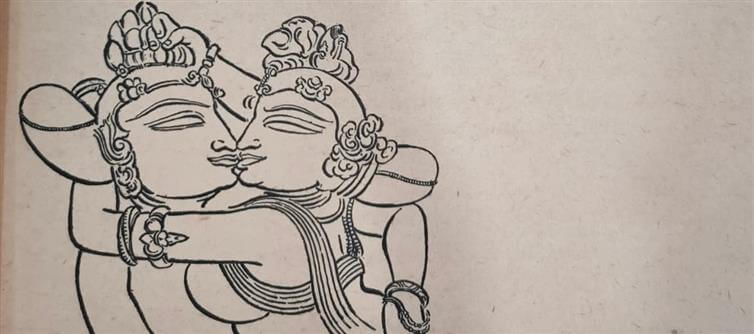
🧠The Forgotten Lesson
Once upon a time, ancient india taught Kama — not as lust, but as knowledge. Gurukuls spoke of desire, love, consent, and the human body with the same reverence as they did for dharma or moksha. Then came the british, draped in hypocrisy, labelling our own wisdom “immoral.” They erased an entire subject from education — and we never brought it back. Now, centuries later, our children are learning about sex from the internet, not from education.
💥 1. india Once Taught What the World Now Learns
Before Freud, before the West even whispered “sex,” ancient india had the Kama Sutra — a treatise on emotional intelligence, relationships, pleasure, and mutual respect. It wasn’t porn. It was philosophy. Kama was one of life’s four goals — not a sin. We’ve gone from celebrating it to censoring it.
😡 2. The british Moral Code Still Rules Our Classrooms
The british left in 1947, but their Victorian shame never did. They taught us to blush at biology, to confuse morality with silence, to think love is sin unless sanctified by marriage. Today, we have politicians banning sex education while pretending ignorance is purity.
📵 3. When Schools Stay Silent, the Internet Speaks
You can ban chapters, but you can’t ban curiosity. Kids will learn — just not from teachers. When schools refuse to teach about menstruation, consent, or safe sex, the internet steps in with half-truths and porn myths. When we avoid the topic, google becomes the guru.
💔 4. Teens Are Drowning in Myths
Ask a teen about periods, condoms, or consent — and you’ll hear confusion wrapped in shame. That’s not their fault; that’s ours. They grow up thinking masturbation is a disease, periods are dirty, and love is rebellion. Lack of sex education isn’t innocence — it’s ignorance dressed as culture.
🩸 5. Real sex education Saves Lives
Proper sex education isn’t about sex — it’s about safety, science, and self-respect. It teaches boys about consent, girls about bodily autonomy, and everyone about boundaries. It prevents child abuse, teen pregnancies, and gender-based violence. It replaces stigma with understanding.
🏫 6. The Rest of the World Has Moved On
From the Netherlands to Sweden, from Canada to South Africa, countries teach sex education as early as grade 5 — and guess what? They have lower teen pregnancy rates, fewer STDs, and more respect for gender equality. Meanwhile, in india, we still debate whether to whisper the word “period” in public.
💬 7. Politicians Turn Knowledge Into Drama
Our government is ready to include sex education. It’s the moral police — the self-proclaimed guardians of culture — who scream scandal at the word “sex.” Ironically, the same people who resist education are the ones caught in the dirtiest scandals.
⚡ 8. Bring Back Kama As Knowledge, Not Taboo
Kama Sutra was never just about positions — it was about the art of living, balancing desire with dignity. sex education is not a Western import; it’s an indian legacy buried under colonial shame. It’s time to dig it out and teach it again — not as sin, but as science.
💣 BOTTOM LINE
When we silence education, misinformation takes over.
When we censor Kama, we create chaos.
Bring back sex education — because it’s not about sex; it’s about survival.
Better to guide than to guess.
🧠 Official Policy
india technically includes sex education under the broader term “Adolescence education Programme (AEP)” or “Life Skills Education”.
This program was introduced by the National aids Control Organisation (NACO) and the Ministry of education (NCERT) to help adolescents understand:
Puberty and reproductive healthGender equality and consent
Prevention of HIV/AIDS and STIs
Emotional well-being and decision-making
🏫 School-Level Reality
Implementation varies a lot between states.
Often, topics are taught indirectly — through chapters on “reproduction” or “human development” — rather than open discussion about sexuality, consent, or safe sex.
📉 Key Challenges
Taboo and stigma: Many parents, teachers, and politicians consider sex education “vulgar” or “Western.”
Teacher discomfort: Many teachers skip or rush the lessons.
Lack of training: Schools often don’t have professionals trained in adolescent health communication.
🌱 Positive Trends
NGOs like TARSHI, Population Foundation of India, and Breakthrough India run independent sex-ed and gender-sensitivity programs.
In recent years, digital platforms (YouTube, Instagram, Byju’s health modules) have filled the gap.
NEP 2020 (New education Policy) encourages holistic health education, which includes reproductive and emotional health — so there’s hope for broader inclusion.
✅ In short:
India does include sex education on paper — but in practice, it’s limited, inconsistent, and often euphemized. The situation is improving slowly as awareness and education ECOSYSTEM' target='_blank' title='digital education-Latest Updates, Photos, Videos are a click away, CLICK NOW'>digital education grow.




 click and follow Indiaherald WhatsApp channel
click and follow Indiaherald WhatsApp channel